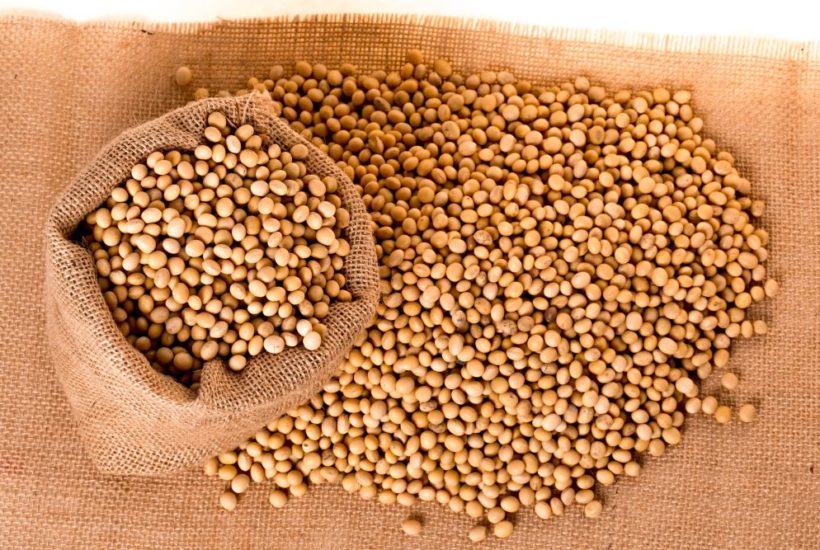Featured
Soybean oil and flour sales increased in Argentina
In September, the companies in the soybeans sector liquidated $1.79 billion, a 14.6% less in the inter-annual comparison. When taking the first nine months of this year, the figure amounts to $15.13 billion, which represents a 12.6% fall with respect to the same period in 2019. The October settlements so far have amounted to $230 million, driven by sales of oil and soybean flour.

The soybean settlements for the month of October accumulated $230 million, according to information from the Central Bank.
Between September 30th and October 7th, 195,109 tons of soybean oil, 308,300 tons of soybean flour, and 19,330 tons of soybeans were commercialized, according to private calculations that allow seeing a strong impulse in the sale of by-products, driven by the differential in export rights for the soybean complex, which is 3%.
Another data to take into account is that in that period, the price of the oilseed went from $281 to $312 per ton.
Sources from the sector consulted by BAE Negocios recognized that, in the last few days, a “strong improvement in the price was registered, with low purchases”. For their part, granary analysts describe a scenario in which the value of the oilseed is not a problem, and variables such as the uncertainty of the possible effects of the climate on the imminent planting of soybeans take on relevance. Thus, producers delay their work and those who buy inputs choose not to sell their grains and resort to other tools to finance themselves.
If you want to read more details about the soybean market in Argentina and to find the latest economic news in the world, download for free the Born2Invest mobile app. Available for both iOS and Android devices, our companion app brings you the latest news so you can stay on top of the market.
In 2020, the trend in foreign exchange soybean settlements was negative compared to the previous year
On the same day of the national government’s announcement of the temporary suspension of the soybean retention, the Chamber of the Oil Industry of the Argentine Republic (Ciara) and the Center of Grain Exporters (CEC) released the September numbers. In that month, the companies of the sector liquidated $1.79 billion, a 14.6% less in the inter-annual comparison and when taking the first nine months of this year, the figure amounts to $15.13 billion, which represents a 12.6% fall with respect to the same period in 2019.
The announcement by the Minister of Economy, Martín Guzmán, of the new guidelines in tax policy generated criticism from the entities that make up the Mesa de Enlace. Within the Argentine Agribusiness Council (CAA), the Argentine Agrarian Federation (CRA), the Inter-cooperative Agricultural Confederation (Coninagro) and the Argentine Rural Confederations (CRA) are part of this space, while the Argentine Rural Society (SRA) chose not to participate.
During the week, one of the questions to be clarified was whether the rural unions that are part of the FAC would abandon this space, in a context of strong criticism of the policy of differential retention by managers.
The three entities that make up the Council ratified their permanence and in the virtual conference that the Mesa de Enlace will hold on October 8th- promoted by the SRA – the ruralists will reflect on their 14-point proposal for the agro-industrial sector, which they presented to the candidates for the 2019 presidential elections. The core of that document was the concern about export rights, where the directors of the unions asked for their complete elimination.
__
(Featured image by pnmralex via Pixabay)
DISCLAIMER: This article was written by a third party contributor and does not reflect the opinion of Born2Invest, its management, staff or its associates. Please review our disclaimer for more information.
This article may include forward-looking statements. These forward-looking statements generally are identified by the words “believe,” “project,” “estimate,” “become,” “plan,” “will,” and similar expressions. These forward-looking statements involve known and unknown risks as well as uncertainties, including those discussed in the following cautionary statements and elsewhere in this article and on this site. Although the Company may believe that its expectations are based on reasonable assumptions, the actual results that the Company may achieve may differ materially from any forward-looking statements, which reflect the opinions of the management of the Company only as of the date hereof. Additionally, please make sure to read these important disclosures.
First published in BAE NEGOCIOS, a third-party contributor translated and adapted the article from the original. In case of discrepancy, the original will prevail.
Although we made reasonable efforts to provide accurate translations, some parts may be incorrect. Born2Invest assumes no responsibility for errors, omissions or ambiguities in the translations provided on this website. Any person or entity relying on translated content does so at their own risk. Born2Invest is not responsible for losses caused by such reliance on the accuracy or reliability of translated information. If you wish to report an error or inaccuracy in the translation, we encourage you to contact us.

-

 Fintech6 days ago
Fintech6 days agoMuzinich and Nao Partner to Open Private Credit Fund to Retail Investors
-

 Crowdfunding2 weeks ago
Crowdfunding2 weeks agoSwitzerland’s Crowdfunding Market Remains Stable – Without Growth
-

 Crypto15 hours ago
Crypto15 hours agoBitcoin Traders on DEXs Brace for Downturn Despite Price Rally
-

 Business1 week ago
Business1 week agoDebt-Fueled Markets, Zombie Corporations, and the Coming Reckoning
























